A Personal Account
by Radha-Krsna Svami
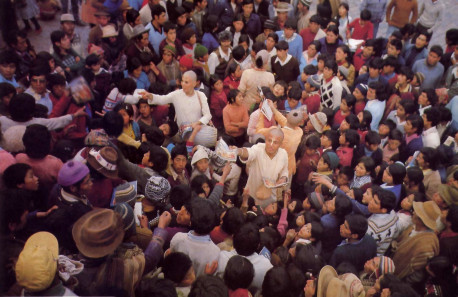
” I’m not my body-I’m the spirit within.” In Cuzco, high in the Andes, Peruvian farming people gather to get Krsna conscious literature
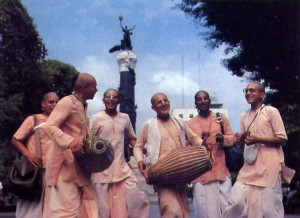
Hare Krsna
When I was a young boy growing up in Mexico City, I would sometimes meditate on what comes after death and why we have to die. And I would pray for more years to live, because I didn’t want to die. I could see that even the most well-off people were distressed, because everybody knows you can’t get away from disease, old age, death, and so many other things that just come of their own accord. You can’t get away from them at all. And I was seeing that whatever kind of happiness you could find, it was just here-today-gone-tomorrow. I have an uncle who’s a philosopher and a theologian, and I would ask him who I was, what God is like, whether I could go back to the spiritual world after finishing this lifetime, and how to live in a spiritual way. But all he knew about was rituals and that kind of thing. When it came to everyday living, he had about as much information as I did. It all left me feeling really disappointed. I felt disgusted with the ordinary materialistic way of life, but the taste I got of spiritual life left me feeling pretty much the same way.
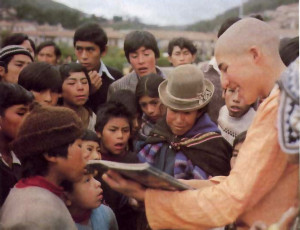
seems to attract their eyes
So I was caught in a dilemma, until my teens, when a friend handed me an old copy of the Bhagavad-gita. Every day I would read one chapter, and every few days I would read all eighteen chapters, and I also started doing the yoga postures that the Gita described. The postures gave me some relief, some peace of mind, and although the Sanskrit-to-Spanish translation seemed to leave something to be desired, I felt intrigued by the descriptions of good and bad karma, life after death, reincarnation, and the path to the transcendental world. The Gita said most people keep coming back to this world life after life, because they’re too attached to its miragelike pleasures, and so they have to get old and diseased and die again and again. But the Gita also said there was a way to become a “great soul” (a mahatma) and go back to the eternal world. It seemed a little like the old saying, “A coward dies a thousand deaths, a hero dies but one,” Yet for me all of this was quite far-off and theoretical. My anxiety was going away, but I had a vague sense that I wasn’t going anywhere.
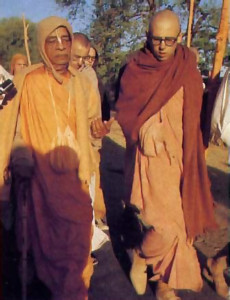
Hrdayananda dasa Gosvami, the disciple he appointed as his Latin American representative
and one of eleven successor gurus.
One day in 1971, I was watching a tv variety show when the host introduced two Hare Krsna devotees as his guests, and they answered his questions about who they were and what they were doing. One of them was a young man from Mexico, and the other was Citsukhananda dasa, a young North American of Latin descent. He said that his spiritual master had asked him to explain the Bhagavad-gita to the people of Latin America and show them how to chant the Hare Krsna maha-mantra. Then the two of them chanted awhile. This was the first time I had heard about the Krsna consciousness movement, but I didn’t take much interest in it.
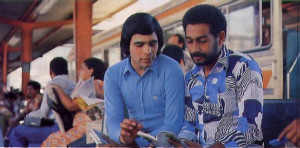
A while later, on a Saturday afternoon, I was doing my yoga postures when a friend came over and said, “I’ve just gone to see the Hare Krsna people at their new center. A lot of local people are becoming members, and they have a big festival every Sunday. So why don’t we go tomorrow?”
I still wasn’t very interested, but we went anyway and tried some of the Krsna vegetarian feast, which I noticed had some dishes that were surprisingly pleasant-tasting. A few months later I went again, just to get some incense. Two months after that I paid another visit, and then the intervals between visits shortened from two months to one month to fifteen days to a week.
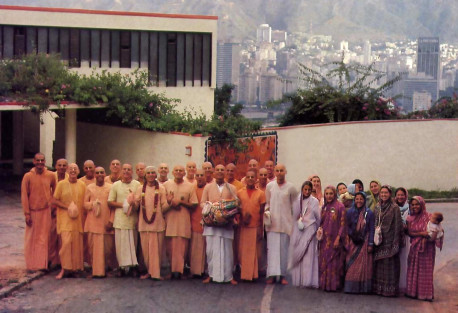
But when Srila Prabhupada, the spiritual master, stopped in Mexico City in 1972, that really decided things for me. From the moment I saw him I knew: “Here is a saintly person, a pure devotee of God.” I figured that if this was the Krsna movement’s founder, then I had to become a member, After that I started chanting the maha-mantra a lot and really getting to know the devotees and reading Srila Prabhupada’s translations, like Nectar of Devotion and Srimad-Bhagavatam. When I read his Bhagavad-gita As It Is, I knew I was seeing Lord Krsna’s treatise on spiritual life with every word intact. It was a new world (a taste of the spiritual world, I sensed, because I felt totally satisfied without the usual materialistic “pleasures,” like smoking and drinking, meat, gambling, and illicit sex). I was naturally satisfied, naturally happy from within.
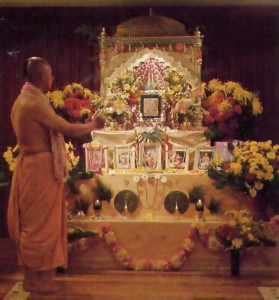 That Mexico City Krsna center was the first in all of Latin America, and the only one at the time I became a devotee. I remember that wherever I went (with my freshly-shaven head and saffron robes), people would immediately start asking me questions. It might begin as a two-person conversation, but before I could turn around, perhaps fifty people would have gathered, and we’d have a discussion on the ABC’s of self-realization and spiritual life.
That Mexico City Krsna center was the first in all of Latin America, and the only one at the time I became a devotee. I remember that wherever I went (with my freshly-shaven head and saffron robes), people would immediately start asking me questions. It might begin as a two-person conversation, but before I could turn around, perhaps fifty people would have gathered, and we’d have a discussion on the ABC’s of self-realization and spiritual life.
“The first point to get clear,” I would explain, “is that you’re not really the material body that you’re living in right now—it’s only an outer covering, a garment. What you really are is the spirit living within your body. We may have so many different kinds of garments,” I would say, “—Latin American, Chinese, French—but inside we’re all very much the same. We’re all spiritual, and we all come from the Supreme Spirit. If you want to have peace inside yourself and peace all around the world, that’s the way you’ve got to see things.”
Quite often someone would ask, “Do you believe in the theory of reincarnation?”
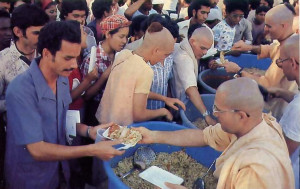
“It’s not a theory,” I would say. “It’s a fact. Reincarnation is just like changing your garment at the end of the day. At the end of your life, you change your body—you get a new body. And what kind of body you get then depends on what kinds of things you’re desiring now. To satisfy your desires you can transmigrate all over the world and all over the universe, from one body to another.” And sometimes I would point out, “Here in Mexico City you see many signs that advertise, ‘Fly to New York and Enjoy the Fun,’ and if you fly to New York you’ll see many signs that advertise, ‘Fly to Mexico and Enjoy the Sun.’ So your desires can carry you from one material situation to another—one body to another—all over the world and all over the universe, but you won’t feel satisfied. Once a fish is out of the water, you can dress him in Levis or a tuxedo or a sequined jacket; it doesn’t matter—he’ll just be choking until you put him back in the water. And it’s the same for us. Wherever we go in the material world, we’ll just feel frustrated. We have to get back to the spiritual world.”
It seemed that every day new people would come to the Mexico City Krsna center and become full-time devotees. In fact, we were getting letters from people in parts of the continent that we hadn’t even been to as yet. Later we opened a second center, in Caracas, Venezuela, and people who had purchased one of Srila Prabhupada’s books either there or in Mexico City would write to us. Usually they would tell us how interested they were, and they would ask whether the devotees were going to come to their town or city and open a center. They would also offer to cooperate with us in every possible way to get the new center established. So within a few years we had opened twenty-three centers, including ones in Puerto Rico, the Dominican Republic, Brazil, Peru, Ecuador, Colombia, Costa Rica, Chile, Guatemala, Bolivia, and Panama. It didn’t seem to matter where we went; people from the area would come and join us. And if a person who had joined us happened to be from a place where we hadn’t yet opened a center, quite often he would decide to go back there and do it himself.
Of course, not everybody felt so favorable. I remember that once when I was distributing Srila Prabhupada’s books on a bus in Bogotá, a man sitting with his arm around a young woman said, “Why don’t you get a job? You’re doing nothing—you’re just parasites.”
“Sir,” I said, “we’re distributing books about self-realization and love of God—this is our job. Now, you might think you’re supporting yourself, keeping yourself alive, but actually it’s God who’s doing all of that. And anyone who doesn’t know it is a parasite. We all have to learn to love God, that’s all.”
“I don’t need you and your books to tell me that,” the man returned. “I already love God.”
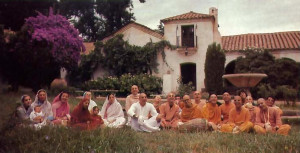
By now everyone in the bus was riveted to our conversation, and I went on. “Perhaps you do love God, sir, but in any case, there’s a simple test you can give yourself—if you love God, are you following His laws?”
“Yes, of course.”
“What about ‘Thou shall not kill’? Almost everybody today is eating animal flesh and in that way sending so many innocent creatures to be slaughtered. Is this following God’s laws?”
The man was staring down at the floor of the bus. Once I’d make that point, hardly anyone ever knew what to say.
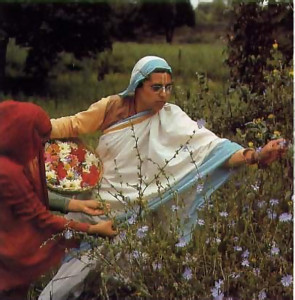
“All of us are worried sick over poverty and natural disasters and epidemics and war, but if we don’t follow God’s simple laws, what can we expect? If we don’t want to watch our culture, our heritage, go down the drain, we’ve got to follow God’s laws, because love of God—real love of God—is the core of that heritage.”
Another time, also on a bus, a young woman asked, “Are you trying to run away? What about addiction, corruption, terrorism—are you just trying to escape the world’s problems?”
“The world’s real problem,” I said, “is that we’re all trying to escape from our relationship with the Supreme Lord. That’s at the root of all our problems. And trying to solve our problems without reviving our relationship with Him is like trying to water a tree leaf by leaf-without watering the root.”
Once a tv emcee made a blunt challenge to Hrdayananda dasa Gosvami, the devotee Srila Prabhupada appointed to represent him in Latin America. “What contribution are you making to society?” the man wanted to know. “So many people are coming into your movement, and isn’t their service being lost to society? What are they actually doing—why don’t they work?”
“I think we work,” Hrdayananda Maharaja replied. “In fact, we work harder than you.”
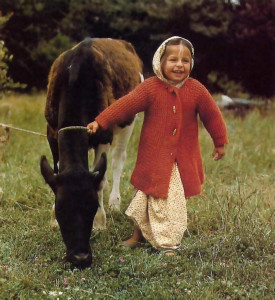
The man was taken aback, and Maharaja continued.
“Even the best plans of the most intelligent leaders haven’t made the world any better,” he said. “Why are all our cities still pocked by crime, drug abuse, and prostitution, even after all the plan-makers have worked so hard? We have to see, finally, that the real problem is spiritual. We’ve forgotten all about God. We’re dreaming that He doesn’t have any part in our world, and now the dream has turned into a nightmare. Now, people like you might choose to deal with the nightmare by falling asleep and becoming part of it, but no—you have to help everybody wake up. That’s the only solution.
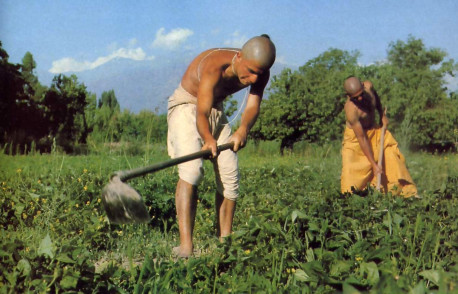
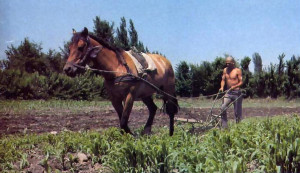
“So the Krsna consciousness movement is working very hard to wake everybody up from this nightmare—this bad dream that there’s no God in control and that it’s simply ‘man against nature’ and ‘man against man.’ This movement is trying to wake the world up to reality: everything we see around us belongs to Krsna, the supreme controller and the supreme friend of everyone, and if we’ll just stop hoarding things, He’ll take care of everything we need.”
Hrdayananda Maharaja went on to say that the world needs a group of people who understand the science of God-realization and self-realization—people who can deal with the world’s actual, spiritual problem. As Srila Prabhupada wrote to me in April of 1977, “This is the success of our movement—that our devotees are becoming learned brahmanas, spiritual teachers. By your own personal example you have to teach others to become brahmanas. Now all of you work together and very vigorously spread Krsna consciousness throughout Latin America.” Many times he has remarked that if just one percent of the population became well-versed in spiritual science and really pure in their everyday living, then the rest of the world would say, “These men have ideal character,” and they would follow their example. “It takes so many stars to fill the sky,” Srila Prabhupada has said, “but it takes only one moon to light it.”
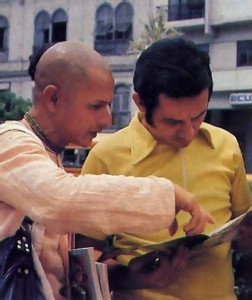
India’s science of self-realization
When we give seminars in colleges and universities, sometimes we talk about this urgent need for spiritually learned teachers, or brahmanas. On one occasion a student asked Hrdayananda Maharaja, “You’re trying to make a caste system, aren’t you?”
“Take any social body anywhere in the world,” Maharaja explained, “and you’ll find it has its natural subdivisions, the same way your own body has its subdivisions: head, arms, belly, and legs. Everywhere you go you’ll find some people who feel inclined to study and teach, others who want to administrate and protect, another group who do best in agriculture and trade, and still others who take an interest in assisting the rest of the people as workingmen. All over the world you’ll find that these subdivisions are already there. The problem is, right now there’s no system for training spiritual teachers or spiritually qualified administrators. So today’s social body has no head and no arms, just a belly and legs. And that’s why the whole world is in such complete chaos.
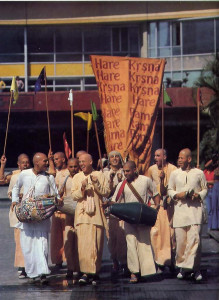
“Now, in a Krsna conscious society anyone can get as much spiritual training as he can absorb. It doesn’t depend on what family you were born in—that would be a caste system, a perversion of the real Krsna conscious social system. No, everything depends on you and the way you want to live your life. For instance, many years ago in India a prostitute’s son asked a great spiritual master to accept him as a student. Generally, a child’s family background gives some hints about his aptitudes, so the master asked the boy who his father was. The boy said he didn’t know, and when he went home and asked his mother, she said she didn’t know, either. Finally he returned and told the master, ‘Sir, my mother doesn’t know who my father is.’ The master felt heartened that even in such an embarassing situation the boy was so pure and honest. “That’s all right,’ he said. ‘You are a brahmana.“
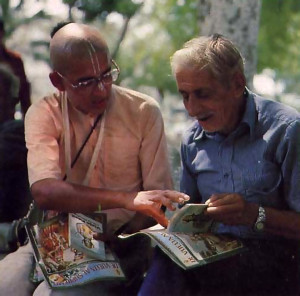
And even in the embarrassing, downright maddening situation called the modern city, the people of Latin America are learning the science of Krsna consciousness, and many are becoming brahmanas and teaching the science to others. Every Sunday hundreds of people come to each of our centers for the Krsna festival, and every summer they come to the Festival of the Chariots. (Last summer in Guadalajara, Mexico, five thousand came out, and this year the government has given us a parade route right through the center of the city.) Wherever they happen to be, we want people to chant and experience the Hare Krsna maha-mantra. Maha means “great,” man means “mind,” and tra means “release.” So the maha-mantra releases the mind from all anxieties and helps the chanter revive his eternal loving relationship with Lord Krsna. Srila Prabhupada has also asked us to introduce the Latin American people to prasada (“the Lord’s mercy,” spiritual food offered to Krsna). So much devotion goes into these vegetarian dishes that anyone who tastes prasada feels an instant uplift in consciousness. As Srila Prabhupada has always said, “Krsna consciousness is practical.”
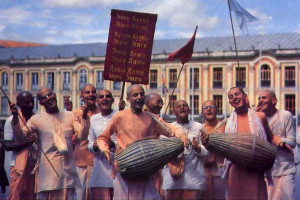
Of course, urban-industrial society is little more than a scheme for fetching food from the nearly uninhabited farmlands, so to be totally practical, people can just live on the land, grow their own fruit and vegetables and grain, and keep cows for milk, butter, yogurt, and cheese. This is the ideal Krsna conscious social setting. Farms provide the perfect economic base and the perfect atmosphere, where workingmen, agriculturalists, administrators, and spiritual teachers can live simply and peacefully. It’s what Srila Prabhupada calls “simple living and high thinking.”
Recently, a man in Guatemala donated seven hundred acres so that we could start a Krsna conscious farm community there, and we’ve just started another farm community in Brazil. Not long ago a Costa Rican gentleman arranged meetings for us with that country’s vice-president and president. And the same man has arranged for several meetings of the national religious council at our center. The religious leaders have become fond of prasada (especially pakoras, breaded cauliflower chunks deep-fried in pure butter), and they visit often. In Lima, Peru, we stop at the correctional institutions each week and distribute prasada to the inmates. The government has written us several letters of appreciation.
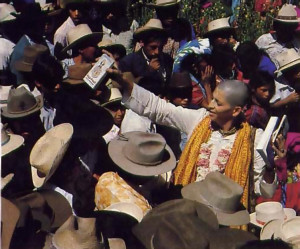
In Mexico we’ve also opened a gurukula (“school of the spiritual master”), so that from their earliest years the devotees’ children can learn the science of the soul. As Srila Prabhupada has so often said, ours is an educational movement, and we’re convinced that every student has a right to learn this most essential of all sciences. Many educators are beginning to feel the same way. A short while back, for instance, a large parochial school in Costa Rica invited us to talk about the Bhagavad-gita at an assembly, and the students and teachers just kept asking more and more questions. They wouldn’t let us go. Whether you present it in Spanish or Portuguese or English or German or the ancient Sanskrit, India’s Vedic literature offers the same original science—the science of the soul, the science of self-realization and realization of God. I recall many times when people have seen us distributing Srila Prabhupada’s books and they have come over to shake our hands and thank us.
The gratitude all goes to Srila Prabhupada, actually, for books that are literally blueprints for the respiritualization of the world. In January of 1977, he wrote a glowing letter to Pancadravida Svami, who along with Hrdayananda Maharaja Gosvami directs the movement’s Latin American activities. “I am very pleased to note your book distribution figures in Latin America,” Srila Prabhupada said. “The seed is already there. Now water it and let it grow, and fruit will come out, the fruit of love of Godhead.”

Leave a Reply